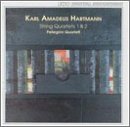| All Artists: Karl Amadeus Hartmann Title: Hartmann: String Quartets Nos. 1 & 2 Members Wishing: 1 Total Copies: 0 Label: Cpo Records Release Date: 1/25/1995 Genre: Classical Styles: Chamber Music, Historical Periods, Modern, 20th, & 21st Century Number of Discs: 1 SwapaCD Credits: 1 UPC: 761203921928 |
Search - Karl Amadeus Hartmann :: Hartmann: String Quartets Nos. 1 & 2
 | Karl Amadeus Hartmann Hartmann: String Quartets Nos. 1 & 2 Genre: Classical
|
Larger Image |
CD Details |
CD ReviewsTough music but worth investigating Rodney Gavin Bullock | Winchester, Hampshire Angleterre | 05/22/2001 (4 out of 5 stars) "The German composer, Karl Amadeus Hartmann (1905-1963), was in his late 20s when he wrote his first string quartet - in the same year Hitler came to power. He hated the Nazis and spoke out against anti-semitism. As a result, the composer was forced into what he called 'inner emigration'. This was not a happy backdrop to his early works and it shows. The music is often extremely dissonant though there are long stretches of tortured lyricism. Bartok's quartets might be a reference point in terms of listening difficulty.The first quartet starts with a long, soulful viola melody which is then joined fitfully by the other instruments and you hear eerie, open harmonies. This section has a bleak beauty but is followed by a fast, grotesque folk-like dance. The second movement begins with a high harmonic note. Soon, a falling figure appears which is repeated obsessively and recurs throughout the movement. Out of this, a tragic theme emerges over drone-like harmonies. A fast final movement begins with a quirky tune and the music becomes faster and more dissonant as the end approaches.The second quartet begins slowly and calmly but then becomes fast and furious. A falling, tender tune starts the middle movement, then there is another fast, dissonant period which winds down to become elegiac and slow and ends with a pure, diatonic chord. The final movement is very fast and motoric and the sound word is decidedly Bartokian.The performances by the Pellegrini Quartet seem very good , as is the recording. The notes take the form of a 'pretend' interview with Hartmann and this has been translated from the original German. The highfalutin ideas combined with a somewhat unidiomatic translation produce something rather weird."
|

 Track Listings (6) - Disc #1
Track Listings (6) - Disc #1